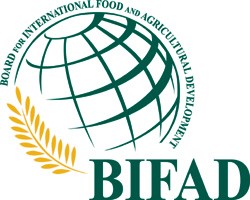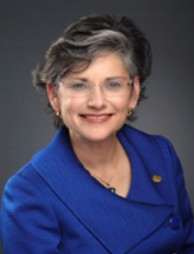Speeches Shim

The Board for International Food and Agricultural Development (BIFAD) advises USAID on agriculture and higher education issues pertinent to food insecurity in developing countries. The President appoints members, who primarily represent the academic community. BIFAD was established by Title XII of the Foreign Assistance Act. The Board and Title XII recognize the critical role of U.S. land-grant institutions in agricultural development, domestically and abroad, and support their representation in USAID development programs.
BOARD MEMBERS
- Mark E. Keenum, BIFAD Chair & President, Mississippi State University
- Pamela K. Anderson, Director General Emeritus, International Potato Center
- James M. Ash, Food & Agribusiness Group Leader, Husch Blackwell LLP
- Brady J. Deaton, Chancellor Emeritus of University of Missouri
- Gebisa Ejeta, Distinguished Professor, Purdue University
- Richard L. Lackey, Chairman and CEO, World Food Bank Inc.
For questions, please contact the Designated Federal Officer for BIFAD, Clara Cohen, at ccohen@usaid.gov or 202-712-0119.
183rd BIFAD Public Meeting
Agricultural Growth, Economic Transformation, and the Journey to Self-Reliance: Implications for USAID Programming
October 13, 2020, 1:00 pm - 3:30 pm EDT (2.5 hours, virtual)
To see the agenda, click here.
To view the meeting recording, click here.
To see the meeting minutes, click here.
A public meeting of the Board for International Food and Agricultural Development (BIFAD), Agricultural Growth, Economic Transformation, and the Journey to Self-Reliance: Implications for USAID Programming, was held on October 13, 2020 from 1:00 pm to 3:30 pm EDT. A public comment period took place from 3:00 to 3:20 pm, EDT. The meeting was livestreamed livestreamed via Zoom.
The U.S. Agency for International Development (USAID) is reorienting its strategies, partnership models, and program practices to achieve greater development outcomes and strive toward a future where foreign assistance is no longer necessary. The approach, outlined in the Agency’s Policy Framework, emphasizes the concept of “self-reliance”—defined as the capacity and commitment of a country to plan, finance, and implement solutions to solve its own development challenges in an effective, inclusive, and accountable way.
BIFAD convened the meeting to better understand the concept of economic transformation—how underdeveloped and agrarian-based countries shift from subsistence agriculture to a commercially oriented economy with diverse agricultural, manufacturing, and service sectors—and how it contributes to a country’s resilience to shocks, such as COVID-19, and its progression toward self-reliance. Authors of a BIFAD-commissioned study shared preliminary findings and lessons learned on emerging success stories in agricultural productivity-led economic transformation and discussed the implications of this evidence for USAID’s agricultural and food security development and social safety net priorities and programming.
On the basis of testimony, including public comments, shared at the meeting, BIFAD provided formal findings, conclusions, and recommendations to the Agency on best-bet operational and programmatic investments for catalyzing agricultural productivity and economic transformation.
Dr. Waded Cruzado Resignation from BIFAD
President Waded Cruzado, President of Montana State University, resigned from the Board August 25, 2020 to focus her energy on leading her university during unprecedented times. Dr. Cruzado has served on the Board since 2012. Dr. Cruzado is appreciated for giving so generously of her time and talent and for her hard work and outstanding service to USAID. During her service, Dr. Cruzado chaired the selection committee for the BIFAD Awards for Scientific Excellence in a Feed the Future Innovation Lab and engaged with higher education partners in the West Africa region. In 2015, Dr. Cruzado hosted the Board at Montana State University and engaged Tribal College leaders in a dialogue with BIFAD about their role in addressing poverty, nutrition, and food security challenges. Many across the Agency are grateful for her superb contributions to the USAID mission. USAID staff thank Dr. Cruzado and wish her every success.

Dr. Waded Cruzado
182nd BIFAD Public Meeting
COVID-19 and Nutrition: Impacts, Field Innovations, and the Way Forward
September 14, 2020, 10:00 am -12:30 pm EDT, 2.5 hours (virtual)
To view the agenda, click here.
To access a recording of the meeting, click here, using Zoom passcode 6f3YY$YJ.
To access minutes of the meeting, click here.
To see findings, conclusions, and recommendations from the meeting, click here.
A public meeting of the Board for International Food and Agricultural Development (BIFAD), COVID-19 and Nutrition: Impacts, Field Innovations, and the Way Forward was held on September 14, 2020 from 10:00 a.m. to 12:30 p.m. EDT. A public comment period took place from 11:50 a.m. to 12:15 p.m. EDT.
This convening followed the June 4, 2020 181st BIFAD meeting, Food Security and Nutrition in the Context of COVID-19, to provide an update on the impacts of the pandemic on nutrition outcomes and to discuss USAID's response. The COVID-19 crisis risks backsliding on nutrition gains with irrevocable impacts on mortality and lost potential. Initial projections show likely significant increases in wasting and forthcoming analyses will quantify the potential impacts on small for gestational age, micronutrient deficiencies, stunting and declines in breastfeeding. Field reporting indicates significant reduction in coverage of key nutrition interventions. These will all translate in loss of life and development gains if not countered with adequate action on nutrition as global decision makers focus on response and recovery.
The meeting provided dedicated time to discuss how the global community can work together to protect and advance nutrition outcomes across sectors during COVID-19 response and recovery. In real time, researchers and implementers are gathering evidence to better understand the impacts of the pandemic and learning how to respond.
The meeting was organized to achieve three objectives:
1. To provide an update on what emerging research and data can tell us about the current and expected impacts of COVID-19 containment and control measures on nutrition, and how we should use this emerging evidence to guide our response.
2. To learn from our implementing partners and USAID Missions across sectors that have pivoted their implementation to respond to COVID-19 and protect nutrition outcomes. To understand the realities on the ground, and to include the innovations and expertise of those on the frontlines in the discourse.
3. To discuss and prioritize actions for the near, medium, and long term to safeguard and accelerate nutrition progress.
The meeting was intended to help support decision making by USAID and its partners and stakeholders working to advance food security and nutrition at global, regional and national levels. On the basis of testimony, including public comments, shared at the meeting, BIFAD provided formal findings, conclusions, and recommendations to the Agency on best-bet operational and programmatic investments.
181st BIFAD Public Meeting
Food Security and Nutrition in the Context of COVID-19: Impacts and Interventions
June 4 2020, 1:30 to 3:30 pm EDT
To view the agenda and presentations, click here.
To hear a recording of the public meeting, click here.
To view findings, conclusions, and recommendations, click here.
To view minutes of the meeting, click here.
The novel coronavirus (COVID-19) pandemic and measures put in place to stop its spread will have impacts on all intermediate results of the U.S. Government Global Food Security Strategy, including agricultural productivity, livelihoods, markets, trade and policy actions, food consumption and nutrition, hygiene and resilience. The Board for International Food and Agricultural Development (BIFAD), an advisory committee to the U.S. Agency for International Development (USAID), convened a virtual public meeting to share the thinking of leading experts in food security and nutrition that relates to COVID-19 impacts. This included consideration of the most promising short-, medium-, and long-term responses across several key areas: farm-level productivity, markets and trade, access to finance, nutrition, safe and hygienic food systems, gender, and national and local policy. The meeting included presentations of credible modeling data about the scale and breadth of anticipated food security impacts in the developing world and a summary spanning near to longer-term interventions and guidance that may help to mitigate COVID-19 impacts. The meeting also provided leading sources of curated information (e.g., landing pages for information related to the crisis and response). The meeting was intended to help to support decision making by USAID and its partners and stakeholders working to advance food security, nutrition, and resilience at global, regional and national levels.
The meeting was a 2-hour webinar, open to the public, with an expert panel and a 20-minute public comment period from 3:10 to 3:30 pm. The recorded audio and video and meeting minutes are available in archive form. On the basis of testimony, including public comments shared at the meeting, BIFAD provided formal findings, conclusions, and recommendations to the Agency on best-bet operational and programmatic investments.

Comment
Make a general inquiry or suggest an improvement.